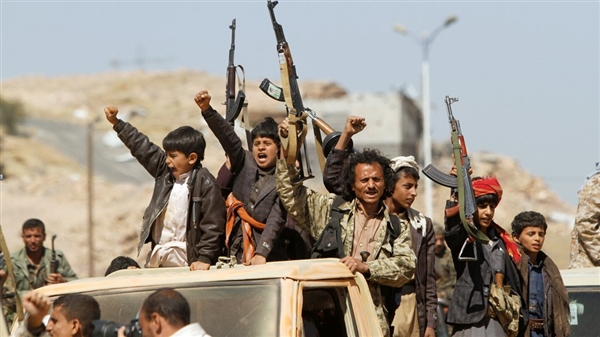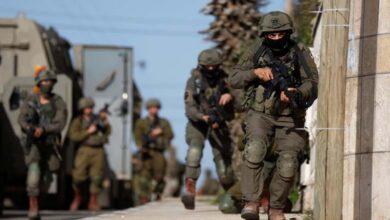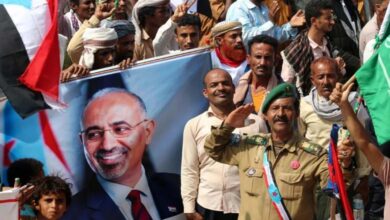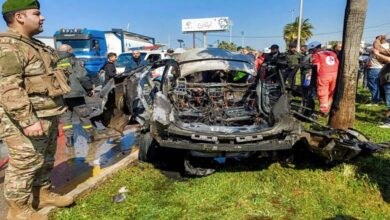Houthi’s Black Record: Human Rights Report Monitors Violations against Minorities

No religious group or minority in Yemen has been spared the brutality of the Houthis, who booby-trapped religious freedoms in the country with Iranian “ideology”.
At a time when Iranian sectarian discourse is intensifying in northern Yemen, particularly in Sana’a, Houthi militias are tightening the screws on minorities and religious sects including Christians, Jews, and Baha’is, until the once-iconic capital of coexistence is a lonely cemetery.
Houthi militias have a black and brutal record against “minorities and religious and sectarian freedoms in Yemen,” but they have not been subject to the statute of limitations. Human rights organizations have documented this, the most recent of which is a report issued by the American Center for Justice, entitled “Religious Freedoms and Minorities in Yemen”.
The report not only demonstrated the seriousness of Houthi terrorism to Yemen’s social and security fabric, but also provided compelling documentation and statistics on the types of violations suffered by Yemen’s religious minorities, including members of the Jewish, Christian and Baha’i communities, based on religious discrimination, for eight years.
‘Minority’ abuse
The Baha’i minority has been at the forefront of violations by Huthi militias after being subjected to a range of abuses including arrests, torture, trials, confiscation of property, and forced displacement.
According to the report, Huthi militias have arrested 71 people, including 6 children, 20 women, and 25 unfair trials of Baha’i individuals, some of whom have been sentenced to death and confiscated property.
The Iranian-backed Houthi militia also displaced six individuals and 25 families out of Yemen, looting nine Baha’i-owned homes and institutions, according to the report.
The Jewish minority came second after being subjected to arrests, forced displacement, the looting of real estate and movable property, and the closure of religious schools.
According to the report, Houthi militias arrested 10 people belonging to Judaism, two schools were closed, and 64 Jews were forcibly displaced and property looted.
The Christian community came in third, with the report documenting 10 cases of arrest and torture, 6 cases of murder, 2 church raids, and 1 case of destruction and burning of a church.
According to the report, Houthi militias committed six cases of arrest and torture, the Brotherhood and their intelligence in Taiz were implicated in three cases, the remaining violations were committed by ISIS and al-Qaeda against the Christian minority, with seven cases of murder, and two cases of storming and burning of churches.
Siege of Dammaj…Attack on ‘Sunnah’
Before it overran the capital, Sana’a, Houthi militias had committed a series of crimes based on sectarian discrimination against the Salafi community in Dammaj, a village in its home province of Saada.
The report documented 1,154 violations, including 199 cases in which 29 children and 4 women were killed. The siege of Dammaj ended with a large-scale operation carried out by force of arms, displacing more than 5,000 Dammaj residents and students from the Salafist group Dar al-Hadith to several provinces in Yemen.
“The siege of the town by Houthi militias left 113 children severely dehydrated and malnourished, 67 others suffering from pneumonia, and 361 civilian objects in the village were damaged, including 6 mosque bombings, 346 homes, 3 hospitals, and 6 water wells”, the report said.
The Salafi community in Dammaj suffered 599 casualties, including 71 children and 9 women, and 33 women were aborted due to fear during Houthi shelling.
In the context of religious freedoms, the report said that Houthi militias singled out the prohibition and restrictions on religious practices, banning the religious practices of Sunni sects such as the prayers of Taraweeh and the observance of the month of Ramadan, and monitoring 411 cases of violation in areas under their control.
The report noted that Houthi militias changed the names of 36 mosques for political, ideological, or sectarian reasons, and blamed Houthi militias for 1,075 cases of using religious pulpits for incitement in areas under their control.
Houthi militias have also turned mosques and places of worship into military barracks and prisons, with the report documenting 303 mosques as barracks, weapons depots, and cantonment centers for fighters in several provinces.
The report indicated that the Municipality of the capital had the largest share of turning mosques into military barracks and prisons. The same violation was accompanied by armed storming of mosques by Huthi militias, and 211 cases of violations were committed in areas under their control in the northern governorates.
According to the report, Houthi militias shelled 79 mosques in Taiz, Hodeidah, Marib, al-Bayda, al-Jawf, Hajjah, Aden, Lahij and Shabwah provinces, as well as 27 mosques and 15 religious science schools in several Yemeni provinces.
The report documented 301 cases of political dismissal of mosque preachers by Houthi militias in the governorates they control, as well as the arrest and enforced disappearance of mosque imams and preachers, in 171 cases.
In Houthi-controlled governorates, the report documented eight violations against imams and preachers; “In the Brotherhood-controlled province of Taiz, the report documented the killing of four imams.”
The report said that the chapter of Houthi violations began with the Houthi militia invading Sanaa with force of arms in late September 2014, particularly after taking control of religious institutions, as religious discourse became not devoid of spreading hatred and sectarianism against opponents and violators.
The report called on Houthi militias to ensure the right to freedom of religion, belief and belief for all Yemenis in all areas under their control, to abandon altogether the notion of distinction, preference and assimilation they claim on religious and sectarian grounds, and to treat all Yemenis equally.
He also called on Houthi militias to “evacuate and restore all mosques that have been turned into headquarters and barracks and weapons depots, and to spare houses of worship during their military operations from any shelling, damage, or partial or total destruction.”
He recommended that any future political agreement include the rights of minorities without discrimination after they were brutally violated by the Huthi terrorist militia.












